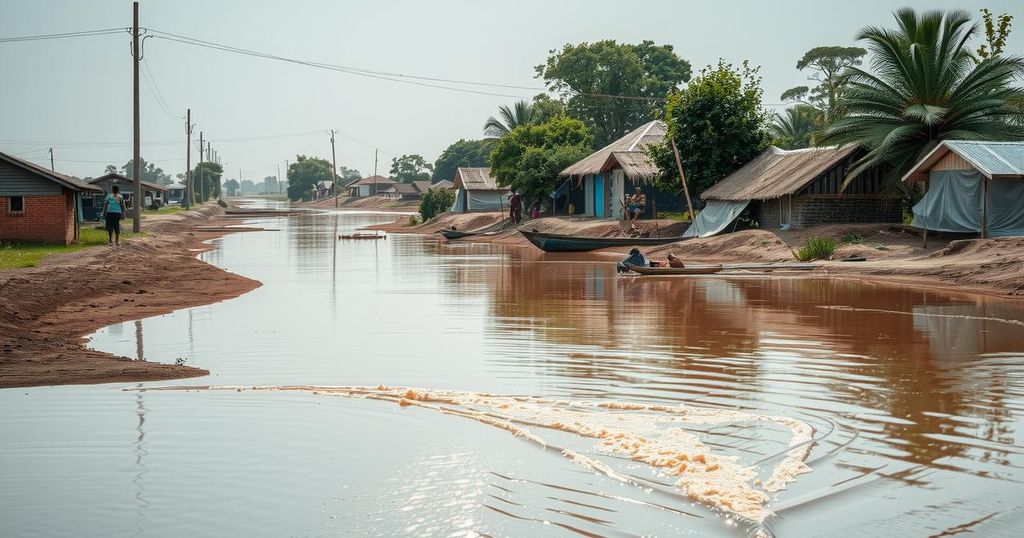Weather
ABYEI, AFRICA, CÔTE D ’ IVOIRE, COTE D ’ IVOIRE, DISEASE, DISPLACEMENT, FLOODS, INTERNALLY DISPLACED PERSONS (IDPS, MALNUTRITION, MINISTRY OF HEALTH, OCHA, SEXUAL VIOLENCE, SOUTH SUDAN, SUDAN, UNITED NATIONS, UNITED NATIONS OFFICE FOR THE COORDINATION OF HUMANITARIAN AFFAIRS, WHO
Jamal Abdullah
0 Comments
UN Alarmed by Rising Malaria Rates Amid Flooding Crisis in South Sudan
The United Nations has warned of rising malaria cases in South Sudan due to severe flooding, impacting 1.4 million people. With 379,000 displaced and ongoing food insecurity, health systems are overwhelmed. The new R21 malaria vaccine is being distributed, as malaria remains a leading cause of child mortality. Disturbingly high incidence rates necessitate increased preventive measures, including mosquito net distributions, to combat the disease.
The United Nations has issued a warning regarding the escalating malaria rates in South Sudan, exacerbated by severe flooding impacting approximately 1.4 million individuals, with over 379,000 people displaced amid ongoing food insecurity. Aid organizations categorize South Sudan as particularly vulnerable to climate change, as the country experiences its most severe flooding in decades, especially in northern regions. The United Nations Office for the Coordination of Humanitarian Affairs (OCHA) reported that flooding has affected 43 counties, including the contentious Abyei region, which is claimed by both South Sudan and Sudan. The health system in the country is under significant strain due to the rise in malaria cases in these flood-impacted areas. Earlier this year, South Sudan and Côte d’Ivoire were pioneers in administering the new R21/Matrix-M malaria vaccine to children at risk. This initiative represents a significant development in the fight against malaria, one of the world’s deadliest diseases. The Ministry of Health has received over 645,000 doses of the vaccine, which were allocated to 28 counties with the highest malaria prevalence, as part of ongoing plans to broaden vaccination efforts nationwide. The World Health Organization (WHO) reports that South Sudan has one of the highest malaria incidence rates globally, with an alarming estimate of 7,680 cases and 18 fatalities reported daily. The mosquito-borne disease is the leading cause of death among children in the nation, with the year 2022 recording approximately 2.8 million pediatric cases and 6,680 deaths. Healthcare professionals are optimistic that the introduction of the R21 malaria vaccine will significantly alter the grim realities they face daily, as the government invests considerable resources in procuring anti-malaria medications and diagnostic kits. Furthermore, the Malaria Consortium indicated that in 2023, 85 percent of the at-risk population was protected through the recommended prevention strategy involving the use of mosquito nets. Researchers consistently emphasize the importance of treated mosquito nets as a fundamental line of defense against malaria, demonstrating their efficacy in reducing transmission and ensuring community health.
South Sudan is experiencing one of its worst flooding crises in decades, which has heightened the vulnerability of its population to various health threats, particularly malaria. The country has a longstanding battle with this disease, characterized by high incidence rates and significant mortality, particularly among children. Recent initiatives, including the rollout of new malaria vaccines and the increased distribution of preventive tools like mosquito nets, are part of a broader strategy to combat this public health emergency amidst ongoing challenges posed by climate change and humanitarian crises.
In summary, the United Nations has raised alarms about the increasing incidence of malaria in flood-affected South Sudan, where a severe humanitarian crisis persists. Efforts to distribute a new malaria vaccine and improve preventive measures are vital steps in addressing this public health challenge. Ongoing support and resources will be critical to ensure improved health outcomes for the millions at risk due to malaria in this vulnerable nation.
Original Source: newscentral.africa




Post Comment